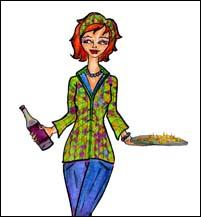 An Eating Disorders Therapist shares tips from her latest book on practicing Mindful Eating
An Eating Disorders Therapist shares tips from her latest book on practicing Mindful Eating
For this article, I will share with you the last three roadblocks to mindful eating adapted from my latest book and audio program, “It’s Not About the Food: A Woman’s Guide to Making Peace With Food and Our Bodies” (www.endyoureatingdisorder.com). I hope you enjoy them.
Roadblock #3: EATING THINGS YOU DON’T WANT
How often have you had the experience of pigging out on something and once you had consumed a lot of it, realized you didn’t even like it? I know I have. Eating things we don’t really want is part of the “mindless eating” phenomenon that is so prevalent in our society. We can easily fall into this trap, what I recently heard someone refer to as a “snackcident,” when we’re not paying attention to what and how we are eating.
Also, many of us learned as children that it was a sin to not eat everything on our plates, and some were even forced to eat everything they were given before they could leave the table! But if you can go back in time and recapture some of your childhood eating memories, can you remember how repulsed you felt by certain foods? Mine was turnip … Just smelling cooked turnip was enough to make me run for cover when I was little.
As adults, and especially as dieters, we may have become increasingly disconnected with our true food likes and dislikes, and will often eat things just because we think they are “good for us.” I’d like to help you reconnect with your inner child so that she can help you re-learn what foods “call to you” and those you’d rather avoid.
For Homework, try answering the following questions in your journal or on a piece of paper:
Make a list of foods you want but do not allow yourself to buy or eat.
What foods are you eating that you don’t really want?
If you allowed yourself to have the foods you want, whenever you are craving them, what do you think would happen?
Roadblock #4: EATING WHEN YOU’RE NOT HUNGRY
The Hunger/Satiety Scale: Hunger has a wide range of intensities. Pay attention to your hunger and fullness cues. Imagine hunger as a scale from 1 to 10 where 1 is hunger to the point of light-headedness, 5 is no hunger, and 10 is “Thanksgiving full” where you may even start to feel pain. Ideally, you want to stay in the middle of this range between slightly hungry and comfortably full. If you allow yourself to get too hungry, everything starts to look good and it’s easy to overeat. On the other hand, if you are always eating before you feel hungry, you are ignoring the natural signals that help you maintain a regular body weight. It is important to stop eating just before you feel full because it takes time for the brain to get the fullness message. Some days you will be more active and require more energy than others, so respond to hunger cues appropriately.
Homework: To learn about satisfaction, at your next meal, try eating half the food on your plate, and then give yourself a rating of where you are on the hunger/satiety scale. If you are at number five or above, stop eating.
Roadblock #5: SNEAKING FOOD
This is a very important area to address, as there is a huge correlation between the phenomenon of sneak-eating and problematic relationships with food and body image. In the 10+ years that I’ve been working as a therapist specializing in disordered eating, I have not yet met one client who has made peace with food and their body without stopping the “sneak-eating” habit.
Homework: Write a list of the ways in which you eat less than what you want because you are in the presence of others. Write a list of the ways in which you currently sneak food. Write a list of the specific foods you sneak. Is there a pattern? What do you notice?Write a list of the ways in which you hide your eating. Is there a pattern? What do you notice?
More Homework: Commit to not sneak food at least once this week and eat it in full view of others. Then write about the experience in your journal. What was it like to tell the truth about what you eat?
Esther Kane, MSW, Registered Clinical Counsellor, is the author of the book and audio program, “It’s Not About the Food: A Woman’s Guide To Making Peace with Food and Our Bodies” (www.endyoureatingdisorder.com) and “Dump That Chump” (www.dumpthatchump.com), and “What Your Mama Can’t or Won’t Teach You” (www.guidebooktowomanhood.com). Sign up for her free monthly e-zine, Women’s Community Counsellor, to uplift and inspire women at: (www.estherkane.com).
